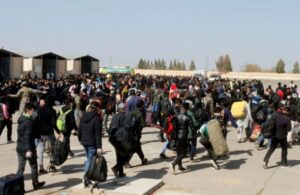KABUL (SW) – Abdul Ghani Baradar, the Deputy Prime Minister for Economic Affairs of the Islamic Emirate, has recently visited Uzbekistan to inaugurate the “Termez International Trade Center.”
During his trip, he met with Azerbaijan’s Deputy Prime Minister to discuss economic cooperation and trade.
According to a statement on the official X account of the Islamic Emirate’s Economic Office, Baradar urged Azerbaijan and its private sector to invest in various sectors within Afghanistan.
The statement also mentioned that Azerbaijan’s Deputy Prime Minister expressed his country’s readiness to reactivate the “Lapis Lazuli Route” as part of its efforts to enhance trade relations with Afghanistan and the wider region.
Since its initiation in 2012 the Lapis Lazuli Transit, Trade and Transport Route Agreement has been developed with a view to enhancing regional economic integration and trade-based connectivity between the countries of Afghanistan, Turkmenistan, Azerbaijan, Georgia, and Turkey.
Additionally, the DPM Baradar revealed Azerbaijan’s intention to boost its export and import activities with Afghanistan and invest in the establishment of industrial factories within the country.

Mining Minister visits Turkmenistan for TAPI, railway talks
In related news, Hidayatullah Badri, Acting Minister of Mines and Petroleum (MoMP) of the Islamic Emirate, has arrived in Ashgabat, Turkmenistan, at the head of a delegation including representatives from the Ministries of Foreign Affairs, Finance, Public Works, and the Breshna Sherkat (the national electricity company).
The visit comes at the official invitation of Turkmenistan. The trip has been on Wednesday.
According to Homayun Afghan, spokesperson for the ministry, the delegation will engage in discussions with Turkmenistan’s officials about “bilateral relations, mining opportunities, TAP project, the construction of a railway line, and the initiation of the TAPI gas pipeline project within Afghan territory”.
Economic experts view Turkmenistan as a “strategic partner” for Afghanistan, suggesting that strengthening ties with the country could enhance trust from other nations, potentially leading to increased economic, political, and investment opportunities in Afghanistan.
Economic analyst Omidullah Qasemzai highlighted the economic benefits of starting the TAPI project and the railway line. “The railway project could facilitate easier trade relations between Afghanistan and Central Asia, while the TAPI project could offer significant economic advantages and foster regional cooperation. Overall, strengthening Afghanistan’s economic and political coordination with Turkmenistan presents valuable benefits for both nations.”
Another economic expert, Zohor Modaber, emphasized that the commencement of the TAPI project in Afghanistan would not only provide transit fees but also create job opportunities for thousands of people.
“The TAPI project, which passes through Afghanistan, Turkmenistan, and Pakistan to India, allows Afghanistan to benefit from transit fees. Approximately $400 million is allocated annually under the contract, which could create thousands of jobs,” he said.
The Turkmenistan-Afghanistan-Pakistan-India (TAPI) pipeline is a project designed to transport natural gas from Turkmenistan through Afghanistan to Pakistan and India.
Construction of the pipeline began in Turkmenistan in December 2015, and while the work in Turkmenistan has been completed, the project’s implementation in Afghanistan, which started in 2018, has faced technical delays.






